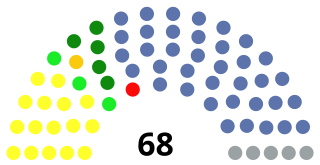
General elections were held in the Netherlands on 5 July 1922. They were the first elections held under universal suffrage, which became reality after the acceptance of a proposal by Henri Marchant in 1919 that gave women full voting rights. Almost all major parties had a woman elected. The number of female representatives increased from one to seven. Only the Anti-Revolutionary Party principally excluded women from the House of Representatives. Another amendment to the electoral law increased the electoral threshold from 0.5% to 0.75%, after six parties had won seats with less than 0.75% of the vote in the previous elections.

Elections in Cyprus gives information on election and election results in Cyprus.

Elections in Rwanda take place within the framework of a multi-party democracy and a presidential system. The President and majority of members of the Chamber of Deputies are directly elected, whilst the Senate is indirectly elected and partly appointed.

Chamber of Counties elections were held for the first time in Croatia on 7 February 1993. The result was a victory for the Croatian Democratic Union, which won 37 of the 63 elected seats.

The Assembly of the Republic is the parliament of the Turkish Republic of Northern Cyprus. It has 50 members, elected for a five-year term by mitigated proportional representation. A party must cross the election threshold to be awarded any seats. The parliament is composed of 50 MPs, chosen from six electoral districts, which are coterminous with the districts of Northern Cyprus: Lefkoşa, Gazimağusa, Girne, Güzelyurt, Lefke and İskele.

Armenians in Cyprus or Armenian-Cypriots are ethnic Armenians who live in Cyprus. They are a recognized minority with their own language, schools and churches. Despite the relatively small number of Armenians living in Cyprus, the Armenian-Cypriot community has had a significant impact upon the Armenian diaspora and Armenian people. During the Middle Ages, Cyprus had an extensive connection with the Armenian Kingdom of Cilicia, while the Ganchvor monastery had an important presence in Famagusta. During the Ottoman Era, the Virgin Mary church and the Magaravank were very prominent. Certain Armenian-Cypriots were or are very prominent on a Panarmenian or international level and the fact that, for nearly half a century, the survivors of the Armenian Genocide have co-operated and co-existed peacefully with the Turkish-Cypriots is perhaps a unique phenomenon across the Armenian Diaspora. The emigration of a large number of Armenian-Cypriots to the United Kingdom has virtually shaped today's British-Armenian community.

Early parliamentary elections were held in Iceland on 25 and 26 October 1959. Following the electoral reforms made after the June elections, the Independence Party won 16 of the 40 seats in the Lower House of the Althing.

General elections were held in Belgium on 20 November 1921. The result was a victory for the Catholic Party, which won 70 of the 186 seats in the Chamber of Representatives. Voter turnout was 91.1% in the Chamber election and 91.0% in the Senate election.

The United Party, known in Greek simply as Eniaion ("United"), was a short-lived moderate right-wing political party in Cyprus.

Early parliamentary elections were held in Moldova on 27 February 1994. They were the country's first competitive elections, and followed deadlock in Parliament over the issue of joining the Commonwealth of Independent States. The result was a victory for the Democratic Agrarian Party of Moldova, which won 56 of the 104 seats.

Full general elections were held in Belgium on 14 October 1894, with run-off elections held on 21 October 1894.

Partial general elections were held in Belgium on 25 May 1902. The result was a victory for the Catholic Party, which won 54 of the 85 seats up for election in the Chamber of Representatives. Voter turnout was 95.7%.

Parliamentary elections were held in Hungary on 8 June 1985. The Hungarian Socialist Workers' Party was the only party to contest the elections, and won 288 of the 387 seats, with 98 of the remaining 99 going to independents selected by the party, whilst one seat remained unfilled until the following year.

Early parliamentary elections were held in Iceland on 18 and 19 October 1942. They were held after reforms were made to the electoral system following the July elections. The Independence Party emerged as the largest party in the Lower House of the Althing, winning 13 of the 35 seats.

General elections were held in Romania in June 1939. The Chamber of Deputies was elected on 1 June, whilst the Senate was elected a day later. They were the first since the introduction of the royal dictatorship of King Carol II under the 1938 constitution. Voters were presented with a single list from the National Renaissance Front, which had been the only legally permitted party in Romania since December.
The Patriotic Front was a political party in Cyprus led by Glafcos Clerides.
The Progressive Front was a right-wing political party in Cyprus.


















